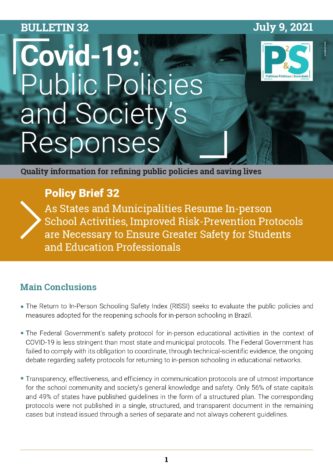Main Conclusions
- The Return to In-Person Schooling Safety Index (RISSI) seeks to evaluate the public policies and measures adopted for the reopening schools for in-person schooling in Brazil.
- The Federal Government’s safety protocol for in-person educational activities in the context of COVID-19 is less stringent than most state and municipal protocols. The Federal Government has failed to comply with its obligation to coordinate, through technical-scientific evidence, the ongoing debate regarding safety protocols for returning to in-person schooling in educational networks.
- Transparency, effectiveness, and efficiency in communication protocols are of utmost importance for the school community and society’s general knowledge and safety. Only 56% of state capitals and 49% of states have published guidelines in the form of a structured plan. The corresponding protocols were not published in a single, structured, and transparent document in the remaining cases but instead issued through a series of separate and not always coherent guidelines.
- Safety protocols were significantly more concerned with emphasizing thermometers and cleaning surfaces than with other more effective measures, such as distributing or promoting high-quality masks and requiring testing to identify active cases in schools.
- The use of high-quality masks (PFF2 or N95) is a scientifically proven effective measure for containing the spread of COVID-19. However, only 2 of the 26 capitals (8%) and 1 of the 27 states (4%) distributed these types of masks as part of the reopening efforts for in-person schooling.
- Proper room ventilation in classrooms was not given due priority in protocols. None of the plans analyzed in this policy brief adopted CO2 monitoring in classrooms.
- The subdivision of school classes into pods, in which in-person attendance by cohorts is rotated, reduces classroom occupation and serves as an efficient tool for isolating contacts in an infection outbreak. However, this policy was proposed by only 3 of the 26 state capitals (12%) and 12 of the 27 states (44%).
Responsible Work Group
- Lorena Barberia (USP)
- Luiz G. R. Cantarelli (USP)
- Pedro Henrique De Santana Schmalz (USP)
- Maíra Meyer (USP)
- Dara Aparecida Vilela Pinto (USP)
- Ingrid C. L. Silva (USP)


